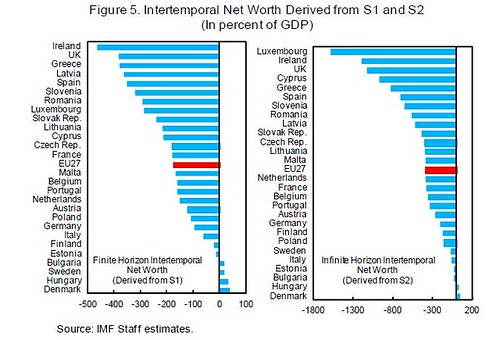Feast your eyes, friends, on the IMF's map of financial interconnections for Greece, included in this paper - they compiled this in an effort to explain why a small country created such a big problem in so short a time. As the Great Satan explains:
An illustration of Greece‘s interconnections in cross-border funding flows reveals why funding strains in Greece in the first half of 2010, despite being by itself small, might have translated into pressures on other Euro Area peripherals. Recall that banking exposures to Greece were relatively small in the context of banks‘ balance sheets; yet, concerns about the strength of balance sheets and the ability of other Euro Area peripheral countries with fiscal and financial vulnerabilities to finance themselves increased as the Greek situation worsened. Using the funds‘ data, Figure 10 presents four clusters (i.e., countries that together form more of a closed system), centered around a set of core connections that are closely linked to Greece: (i) a red cluster of countries with access to funds domiciled in Luxembourg; (ii) a black cluster with access to funds domiciled in the offshore centers of British Virgin Islands, Jersey, Cayman, Guernsey, and the Isle of Man; (iii) a blue cluster with Ireland at the core; and (iv) a green cluster of the U.S. with several key European and other countries. Greece is interconnected with each of the central nodes of these clusters. This close interconnection across other core countries suggests why asset re-allocations and flows might have been large systemically, with potentially significant impact on countries such as Ireland.
[Anyone notice the black cluster carefully enough? Now that is scary stuff.]
This paper is dated 6 October 2010. Since then, our contagious germs have come back to get us - by making it that much more difficult for our banks to raise funds. Which is a problem because as things currently stand, our banks are getting an increasingly high share of their funding from Europe's Central banks and the ECB. As of September, Greek banks were using EUR94.5bn of Central Bank money (see below), compared to EUR213bn of depositors' money.








